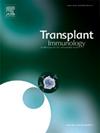Long-term outcomes of ABO-incompatible kidney transplantation in Argentina: A 10-years single-center experience
IF 1.4
4区 医学
Q4 IMMUNOLOGY
引用次数: 0
Abstract
Introduction
ABO-incompatible (ABOi) kidney transplantation is a feasible option for patients without ABO-compatible (ABOc) living donors. However, its impact on rejection rates and long-term outcomes remains debated. This study aims to compare rejection incidence, graft survival, and patient outcomes between ABOi and ABOc kidney transplant recipients.
Methods
We conducted a retrospective, observational, analytical cohort study at the Hospital Privado Universitario de Córdoba, including all ABOi living donor kidney transplants performed between July 2014 and August 2024. For each ABOi recipient, an ABOc counterpart was matched based on age (±5 years), transplant date (±1 year), and sex (when possible). Patients were followed for up to 10 years post-transplant. Immunosuppressive protocols and infectious prophylaxis followed institutional guidelines.
Results
Of 217 living donor kidney transplants, 33 (15.2 %) were ABOi. No significant differences were found between ABOi and ABOc groups in demographic or clinical baseline characteristics, except for donor age (p = 0.026). There were no differences in graft function, major complications, graft loss, or mortality between groups. Acute rejection occurred in 11 ABOi patients (9 humoral, 2 cellular) and 10 ABOc patients (5 humoral, 4 cellular, 1 mixed), with no significant differences. The 10-year overall patient survival was 82.8 % for ABOi and 83.7 % for ABOc, while death-censored graft survival was 96.4 % and 91.7 %, respectively. The non-use of thymoglobulin was the only independent predictor of rejection (aOR = 5.44; 95 % CI = 1.16–25.5; p = 0.031).
Conclusion
ABOi kidney transplantation demonstrates comparable long-term outcomes to ABOc transplantation. It is a viable and safe alternative for patients lacking ABO-compatible living donors.
阿根廷abo血型不相容肾移植的长期结果:10年单中心研究
摘要:ABO-compatible (ABOi)肾移植对于没有ABO-compatible (ABOc)活体供者的患者是一种可行的选择。然而,它对拒绝率和长期结果的影响仍存在争议。本研究旨在比较ABOi和ABOc肾移植受者的排斥发生率、移植物存活率和患者预后。方法:我们在Privado Universitario de Córdoba医院进行了一项回顾性、观察性、分析性队列研究,包括2014年7月至2024年8月期间进行的所有ABOi活体肾脏移植。对于每个ABOi受者,根据年龄(±5 岁)、移植日期(±1 年)和性别(如果可能)匹配ABOc配对者。患者在移植后随访10 年。免疫抑制方案和感染预防遵循机构指导方针。结果:217例活体肾移植中,33例(15.2% %)为ABOi。除供体年龄外,ABOi组和ABOc组在人口统计学或临床基线特征方面无显著差异(p = 0.026)。两组间移植物功能、主要并发症、移植物损失或死亡率均无差异。11例ABOi患者(9例体液性,2例细胞性)发生急性排斥反应,10例ABOc患者(5例体液性,4例细胞性,1例混合)发生急性排斥反应,差异无统计学意义。ABOi的10年总生存率为82.8 %,ABOc的10年总生存率为83.7 %,而死亡审查的移植物生存率分别为96.4 %和91.7 %。不使用胸腺球蛋白是排斥反应的唯一独立预测因子(aOR = 5.44;95 % CI = 1.16 - -25.5; = 0.031页)。结论:ABOi肾移植与ABOc肾移植的远期疗效相当。对于缺乏abo相容活体供体的患者,这是一种可行且安全的替代方案。
本文章由计算机程序翻译,如有差异,请以英文原文为准。
求助全文
约1分钟内获得全文
求助全文
来源期刊

Transplant immunology
医学-免疫学
CiteScore
2.10
自引率
13.30%
发文量
198
审稿时长
48 days
期刊介绍:
Transplant Immunology will publish up-to-date information on all aspects of the broad field it encompasses. The journal will be directed at (basic) scientists, tissue typers, transplant physicians and surgeons, and research and data on all immunological aspects of organ-, tissue- and (haematopoietic) stem cell transplantation are of potential interest to the readers of Transplant Immunology. Original papers, Review articles and Hypotheses will be considered for publication and submitted manuscripts will be rapidly peer-reviewed and published. They will be judged on the basis of scientific merit, originality, timeliness and quality.
 求助内容:
求助内容: 应助结果提醒方式:
应助结果提醒方式:


